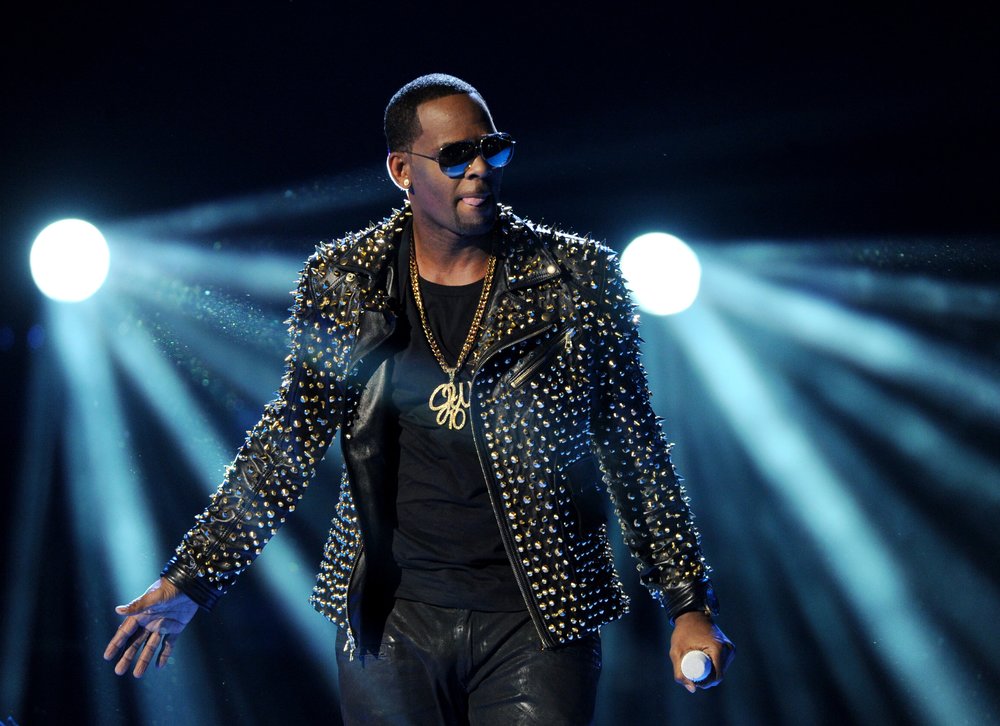If R&B superstar R. Kelly has been “hiding in plain sight,” as the second episode of Lifetime’s docuseries Surviving R. Kelly alleges, the harrowing testimonies of his victims shines an unflinching light on his misdeeds. But the narrative also makes it apparent how abusers often cannot terrorize their victims without help.
The three-day, six-hour documentary, which premiered on January 3, centered survivors of alleged sexual and physical abuse from Kelly. Executive produced by writer and filmmaker dream hampton, the docuseries features more than 50 interviews with Kelly’s victims and their families, as well as Chicago-area journalists, law enforcement, and individuals close to the singer.
Although the content is admittedly difficult to stomach, I watched to bear witness to these women, as did many other viewers.
The similarities between the women’s experiences becomes clear from the very first episode. Many were adolescent girls when they met Kelly—they were avid fans and flattered to be invited into his presence. Others hoped he could hone their talent and catapult them into stardom using his music industry connections. They looked up to him as a possible mentor.
But if it takes a village to raise a child, Kelly’s notoriety as a predator demonstrates that it also takes a village to help one man destroy a child. The web of complicity often spreads far and wide.
R. Kelly is, by most accounts, a charming man publicly. But the women he harmed say it didn’t take long for the mental, physical, and emotional abuse to happen in private.
On the docuseries, the survivors, often in tears, recounted stories of being slapped, choked, starved, isolated from their families, and coerced into sexual acts with teenage girls or women. Kelly forbade them from speaking to other people in his home, and also instructed staff not to speak to them. Proximity to power seduced the people in his camp to enable him to abuse, and to sanitize his image amid troubling allegations.
Employees, associates, and others helped him restrict the women’s comings and goings, how they could dress, or when they could eat. He appeared untouchable because the people around him were willing to act—or do nothing—at his command, standing between him and the consequences of his alleged actions.
Even after the press uncovered proof of R. Kelly’s 1994 marriage to then-15-year-old singer Aaliyah when he was 27, the music industry considered it business as usual. They hired him to write their hits. They featured him on their songs.
Although Kelly is a larger-than-life example of the devastating effects of abuse, elements of his story are sickeningly familiar. Many of us have members of our family whom we know we cannot leave with our children. Familial whisper networks develop, but they do a shoddy job of bringing justice to survivors or preventing further abuse. In order for those reputations to form, someone had to have been harmed first—or second, or third. But we continue to invite those abusers from our family circles into our homes without publicly addressing the danger they pose.
Kelly’s former tour manager Demetrius Smith claimed he falsified the marriage certificate and was present at Aaliyah and R. Kelly’s (illegal) wedding. He noted in the documentary that Aaliyah looked “worried and scared,” that he wished he had done something to help her. Barry Hankerson, who was Aaliyah’s uncle and Kelly’s manager, still maintained professional ties with the “Bump and Grind” crooner for five months after he found out Kelly married his niece.
It may have surprised and shocked many viewers to learn that R. Kelly used to cruise local high schools to pick up underage girls. But this was an open secret to many in Chicago. Craig Williams, a friend and fellow producer, admits he wondered, “What the heck is he doing hanging around the high school?” but did nothing to stop his friend or to help the girls Kelly preyed on.
R. Kelly’s abuse didn’t go unnoticed. Bruce Kelly, the singer’s older brother, found it disappointing that his sister-in-law, Andrea Kelly, wasn’t allowed to invite her family to her wedding or have contact with them afterward. Stephanie “Sparkle” Edwards, a protege of R. Kelly, remarked how Andrea Kelly had to ask her husband for permission to eat, leave, or do other simple things in her own home.
“Wow,” Edwards said, “Couldn’t be me.”
But these abusive tactics didn’t alarm her enough to reach out to help the other woman.
Self-recriminations echoed throughout the episodes from many of Kelly’s former associates, friends, fans, and family. Edwards said she regretted introducing him to her 12-year-old niece, who, she testified in 2008, was seen on an infamous pornographic tape with Kelly when she was 14 years old. Several of the victims’ family members initially allowed their teen daughters contact with R. Kelly despite decades of allegations. They simply didn’t believe the stories reported about him—until the same thing happened to their loved ones.
Or, as in our own communities, parents assumed they could protect their children from a predator by addressing the child as the problem rather than the adult preying on them.
Even when victims shout outside the whisper network, the community’s refusal to act leads to more instances of abuse. It doesn’t always take a celebrity’s charisma to ensure silence protects an abuser—just a few ordinary people doing nothing.
So many people knew or suspected something, even if they did not realize the extent of R. Kelly’s manipulation and violence. But no one in his circle warned these girls or women to stay away from him. No one so much as whispered to save Black girls. Publicly, his alleged predilection for teenage girls became a punchline, which made it inarguably harder for his victims to be heard over our collective laughter. And privately, it went unacknowledged, enabled by those closest to him.
Surviving R. Kelly urgently calls on us to quash the predatory song of the Pied Piper of R&B. For over 20 years, whether out of ignorance or ambition, it has been easier to silence Black girls and women than to #MuteRKelly. We can only hope Robert Sylvester Kelly’s career will not survive the damning testimony of his victims.
But once we turn down his music, what will we hear in its place? Will we finally be ready to listen to the cries of survivors in our own communities? They are waiting for us to hear them, too.
Have you experienced sexual assault and need to talk to someone?
Call the national sexual assault hotline at 800.656.hope (4673).
Girls for Gender Equity – GGE has a viewer guide to help navigate the issues this groundbreaking and necessary docuseries brings up for survivors, victims, and our community.

















